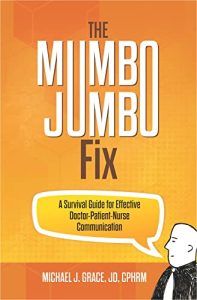 The issue of healthcare illiteracy continues to grow especially as technology advances in healthcare practice. Only about 12% of the population can speak “medicalese.” Nurses and doctors speak with a mumbo jumbo of healthcare communication techniques and vocabulary that more often than not serve to confuse and bewilder patients and family members at some of the most significant points in their lives.
The issue of healthcare illiteracy continues to grow especially as technology advances in healthcare practice. Only about 12% of the population can speak “medicalese.” Nurses and doctors speak with a mumbo jumbo of healthcare communication techniques and vocabulary that more often than not serve to confuse and bewilder patients and family members at some of the most significant points in their lives.
If you’ve ever found yourself in a situation of being given a terrible diagnosis, or been with a family member or friend as the news was delivered, you know how overwhelming that scenario is. The moment the practitioner says words like cancer, HIV, heart failure, diabetes, etc., the world stops spinning. You only hear those words and the rest of the conversation could be all about your winning the lottery, but you’ll never hear it! Add in an unfamiliar language, and the conversation goes south immediately.
If the practitioner continues on and uses as many professional terms as he possibly can to seemingly get through and avoid the uncomfortable aura in the room, the situation is only made exponentially worse. His colleagues and co-workers may understand this mumbo jumbo, but the patient and family are left out in the cold trying to remember all that was said and what exactly it means. How did they get here, and will their lives ever be the same?!
Communication is essential to the success of any relationship and situation. Effective verbal communication is built on two important ingredients; talking (speaking) and listening. If one of those elements is unclear or messed up somehow, the other goes to heck in a handbag quickly. The failure to communicate can set in motion a horrific set of unfortunate events, which for healthcare workers can spell disaster and malpractice. And the patient is left alone and defenseless.
Mike Grace is the author of The Mumbo Jumbo Fix. He founded the Grace Hollis LLC law firm in San Diego, CA and worked for 20 years as a medical malpractice attorney defending healthcare workers. When he retired from his law practice he became certified by the American Hospital Association and works as a professional healthcare risk management manager and patient safety officer in a Southern CA hospital. At UC Riverside’s extension program, Mike teaches law and communication to nurses.
This book is a MUST for nurses and doctors as well as all other healthcare workers! It’s an easy read and offers great incite into how poor communication can lead to tragic events and outcomes if nurses and other healthcare workers don’t put aside their vast medical vocabulary and communicate effectively among themselves and with patients and family members. There are lots of great cartoons in the books as well that serve to illustrate the problems ineffective communication can create. Many thanks to Mike Grace for bringing this book to my attention.

